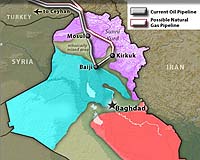 |
Lagos, Nigeria (UPI) Jan 22, 2009 The power vacuum in Nigeria, one of Africa's leading oil producers, caused by the two-month absence of ailing President Umaru Yar'Adua is putting the all-important oil industry in jeopardy by delaying reforms and threatening to re-ignite an insurgency in the oil-rich south. Yar'Adua, who has a history of poor health, was flown to Saudi Arabia for hospitalization with a heart condition on Nov. 23, leaving no designated successor and plunging Africa's most populous nation into constitutional confusion. There was neither sight nor sound of Yar'Adua for weeks, triggering nationwide suspicions that the 58-year-old president was dead or dying. Finally, on Jan. 11 he had to announce on the BBC's Hausa language service from his hospital bed in the Red Sea city of Jeddah last week that he was still alive and would return. Two days later a federal court ruled that Vice President Goodluck Jonathan could begin assuming the powers of acting president -- but stopped short of formally transferring those powers to him. That deftly avoided a potentially explosive rift between Nigeria's rival political barons in the Muslim north and the Christian south of the country but did not defuse the political turmoil Yar'Adua's prolonged absence has caused. The failure to delegate authority has paralyzed government and blocked decisions on several important issues, notably the peace process Yar'Adua launched in the summer to end five years of insurgency in the south that has caused immense damage to the oil industry. Yar'Adua absence has also stymied negotiations between the government and the major international oil companies that operate the southern fields on renewing their leases, which expired in 2008 after a 40-year tenure. These were extended by one year in view of plans to implement sweeping changes in the oil industry. Those expired in November 2009. The oil companies, including Royal Dutch Shell and Chevron and Exxon Mobil of the United States, want to extend their leases for lengthy periods but are balking at the government's demands ahead of parliamentary approval of a Petroleum Industry Bill. But the process has been greatly complicated by a bid from Chinese energy giant CNOOC in September to acquire 23 licenses, including 16 operated by Shell, Chevron and Exxon. CNOOC offered $50 billion to the federal government to acquire a 40-percent stake in what amounts to oil reserves equivalent to 6 billion barrels and sweetened the pot by promising major investment in infrastructure projects. This seriously upped the financial ante on the whole process, which has now been largely stalled by Yar'Adua's prolonged absence. Shell, which like the other foreign firms operates through joint ventures with the state-owned Nigerian National Petroleum Co., has vowed to fight tooth and nail to prevent its leases going to the Chinese. The Sunday Times of London has reported that Shell plans to sell fields valued at up to $5 billion because the government wants to impose stricter terms on foreign companies and give greater control to Nigerian firms through the Petroleum Industry Bill. However, Nigerian officials say Shell does not have the legal right to sell assets it operates with the state oil company. In the south, insurgents who surrendered their weapons to government forces during a summer amnesty declared by Yar'Adua are becoming restive because they claim the government has not kept its promise of providing jobs and allowances. The main rebel coalition, the Movement for the Emancipation of the Niger Delta, has warned that it may resume attacks on oil installations in the southern swamplands. The fragile truce is seen as Yar'Adua's greatest success since he became president in 2007 elections marred by fraud and violence. But that may be starting to fray now that the process has stalled because of his absence. On Jan. 8 gunmen blew up a Chevron pipeline in the delta in what was seen as a warning to the government. The last thing it wants now is renewed attacks on the oil industry. MEND operations slashed production by 1 million barrels a day to 1.5 million when the summer amnesty took hold. That cost Nigeria $1 billion a month in lost revenues.
Share This Article With Planet Earth
Related Links Powering The World in the 21st Century at Energy-Daily.com
 Iraq seeks to cash in on its gas
Iraq seeks to cash in on its gasBaghdad (UPI) Jan 21, 2009 Iraq is seeking to exploit its vast natural gas reserves, a resource that has had to play second fiddle to the country's oil wealth, and has signed a strategic energy agreement with the European Union to develop the gas fields. But just as Iraq's drive to develop its major oil fields and quadruple production through a chain of multibillion-dollar contracts with international oil compani ... read more |
|
| The content herein, unless otherwise known to be public domain, are Copyright 1995-2009 - SpaceDaily. AFP and UPI Wire Stories are copyright Agence France-Presse and United Press International. ESA Portal Reports are copyright European Space Agency. All NASA sourced material is public domain. Additional copyrights may apply in whole or part to other bona fide parties. Advertising does not imply endorsement,agreement or approval of any opinions, statements or information provided by SpaceDaily on any Web page published or hosted by SpaceDaily. Privacy Statement |